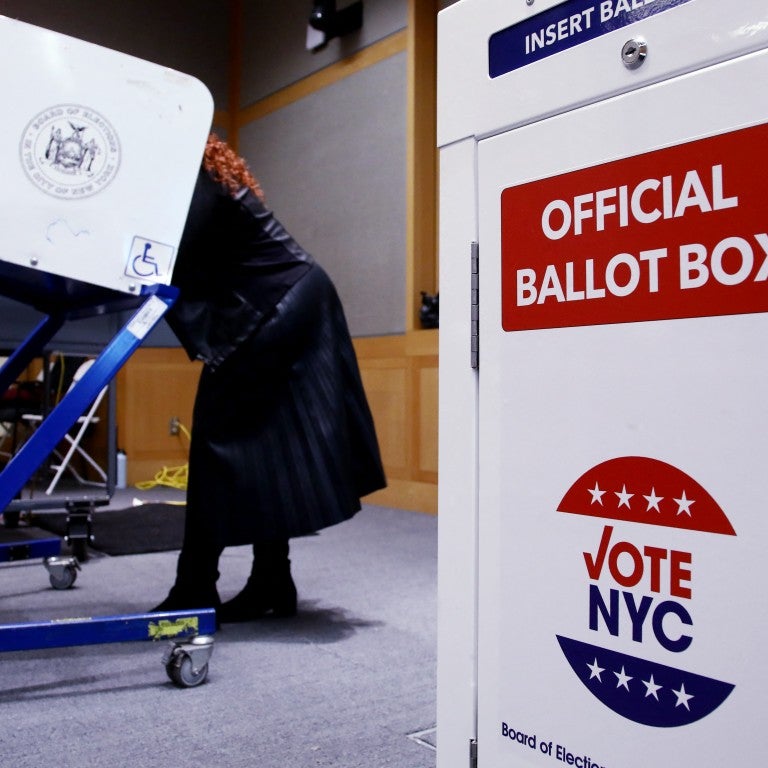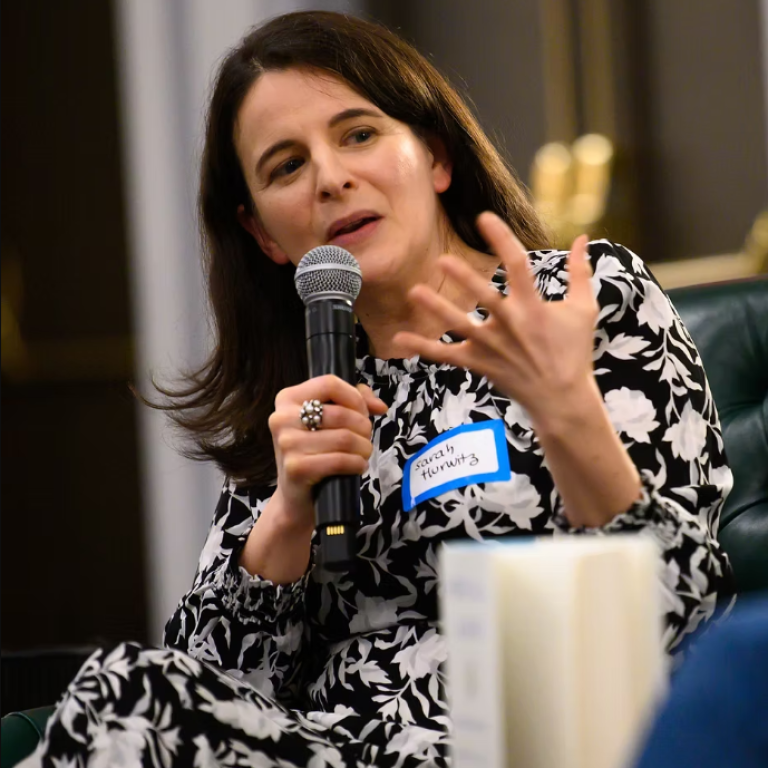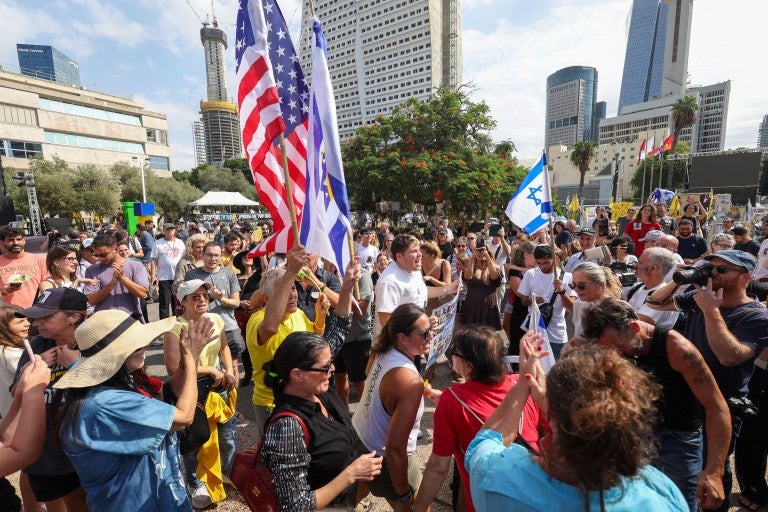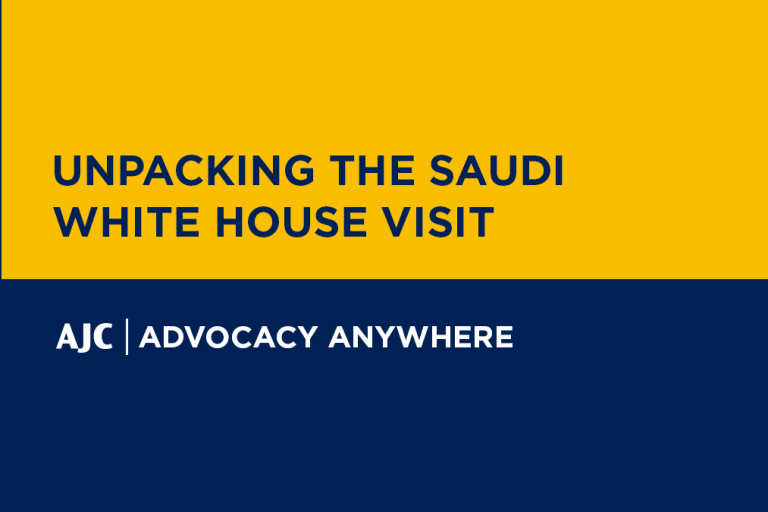February 7, 2025
During a White House press conference with Israeli Prime Minister Benjamin Netanyahu, U.S. President Donald Trump made a stunning proposal: that the United States take control of Gaza. His remark sparked intense global debate.
This week, we break down the implications with Jason Isaacson, AJC’s Chief Policy and Political Affairs Officer. Jason examines the proposal and shares AJC’s perspective on what it means for the future of the region.
Resources:
Listen – AJC Podcasts:
- The Forgotten Exodus: with Hen Mazzig, Einat Admony, and more.
- People of the Pod:
Follow People of the Pod on your favorite podcast app, and learn more at AJC.org/PeopleofthePod
You can reach us at: peopleofthepod@ajc.org
If you’ve appreciated this episode, please be sure to tell your friends, and rate and review us on Apple Podcasts or Spotify.
Transcript of Conversation with Jason Isaacson:
Manya Brachear Pashman:
During a press conference with Israeli Prime Minister Benjamin Netanyahu at the White House this week, US President Donald Trump proposed that the United States “take over and own the Gaza Strip”, suggesting long term control and suggesting the Israel Hamas war would soon come to an end.
Whether one considers the proposal innovative or absurd, the surprising declaration underscored the need for a new approach to Gaza's future. With us now to discuss the impact of the President's words is Jason Isaacson, AJC's Chief Policy and Political Affairs Officer. Jason, thank you for joining us.
Jason Isaacson:
Thank you, Manya. It's good to be back.
Manya Brachear Pashman:
So Jason, I'll just ask you straight up, is this proposal innovative or absurd?
Jason Isaacson:
Well, of course, there are people who will say it's both. From my sense of the conversations I've been having in the Middle East over the last several days, last couple of days. First of all, it caught everybody by surprise. It does seem to be a little bit half baked, because there are many questions that arise when one starts digging into some of the details, which have been lacking.
And it's also very important to point out that the day after the President presented this very surprising, innovative, out of the box proposal, there were comments from various White House officials that suggested, you know, don't take it quite so literally as the way it was laid out by the President.
Even Mike Waltz, the National Security Advisor, suggested that it really, in many ways, is an attempt to kind of change everyone's thinking in the region, and force, urge, somehow move the Arab states to put forward their own innovative proposals. Because clearly, we're stuck, and we've been in a rut for decades, certainly since the Hamas takeover of the Gaza Strip almost two decades ago.
And over the last year and a half of terrible conflict, the last 16 months of war, it's clear that no reasonable plan has been put forward that will really nail down not only the release of the hostages right away–which is insane that you've had hostages held for 16 months–but not even achieving the objectives that had been laid out at the very beginning of this conflict by the Israeli government, which was the necessity of Hamas no longer ruling Gaza.
Because with Hamas ruling Gaza, you will never have a two state solution. You'll never have Palestinian rights. You'll never have peace in that region. You won't have 10s of 1000s of Israelis moving back to their homes in southern Israel, you will not be able to make the kind of progress toward regional peace that is necessary. Hamas is an extremist terrorist organization that wants to kill Jews. Wants to destroy the State of Israel. They don't want a 2-state solution. They want the end of Israel.
So they can no longer be in charge. They can no longer threaten the Palestinian people with their aspirations for political change, and they can no longer threaten the people of Israel. They can no longer govern Gaza. And no one has come up yet with the definitive path forward to eliminate that continued Hamas threat.
So there is a ceasefire agreement, ceasefire hostage release deal, that is in progress right now. Ultimately, the third stage of all of that, after we get through the second stage, which is yet to dawn, would be a new governing structure, but that is still in the future, and it's still not clear that we're going to get there anytime soon.
So the idea of putting forward something bold and new and totally different has a certain logic to it, even if elements of what the President was saying the other night seem to be wanting certain degrees of logic. But we're still trying to figure out whether it was a genuine proposal, or just a slap in the face of the region saying, Okay, let's do something different and bold. Let's move forward.
Manya Brachear Pashman:
Even if we aren't supposed to take this proposal quite that literally, can you explain the proposal and what led to it?
Jason Isaacson:
Well, the proposal, basically says, if I understand it correctly, that the United States would kind of take charge and would conduct demining and clearing of the rubble and coordinating the reconstruction of Gaza. Which would require, according to the President's formulation, the removal of the Palestinian population. Some 1.7, 1.8 billion Palestinians who live there and are living in terrible conditions right now because so much of the infrastructure and the homes have been either badly damaged or destroyed.
And so there's a certain logic, certainly, if you're a real estate man and you know how to redevelop property, if you're knocking down lots of buildings and you're trying to put up something new, you've got to get the people out of the way. So I can understand that reason, that reasoning. But this is a population that doesn't necessarily want to leave.
Obviously, maybe some do, but it's very clear that there is a long embedded national movement among the Palestinians, which clings to that land, as miserable as the conditions may be there. And so therefore, if you are going to follow the President's plan, which would require the removal of people, they will be removed against their will, many of them, at least, and where would they be moved to? Unclear. The President originally said several days ago that he thought that they should go to Egypt and Jordan.
Both countries have said clearly, as clear as day, no thank you, we do not want them. Palestinians belong in Palestine, which doesn't yet exist. They don't belong in our countries. This was a long standing position of both the Kingdom of Jordan and Egypt.
And then where else would they go? There is no market internationally for accepting hundreds of thousands, let alone more than a million Palestinian temporary dislocated persons. Not clear that they would be away for very long, although I think the way the President was describing this project, we could be talking about a 10 or 15-year redevelopment plan in which he envisions a Riviera on the Mediterranean, another Riviera on the eastern Mediterranean, which is, you know, a wonderful vision, but how we actually get from here to there with so many complications in the way is totally unclear.
There will be so much resistance. There already is. Within hours, there were immediate statements of pushback from the region. So what I hope this will mean is people across the region, and AJC is staying in the region. We've been in Israel for the last several days, we had an AJC Board of Governors solidarity mission to Israel earlier this week, and then a number of us are staying on and talking to people across the region.
We'll get a sense for how the region is responding and whether this plan to prod the region to come up with something decisive that will actually help resolve this problem in Gaza, end the terrorist scourge that makes it impossible to move forward on peace, makes it impossible for Israelis to live in peace alongside their Palestinian neighbors. We'll get a sense of that.
Right at this point, really, the ball is in both courts. The American court, because clearly the president wants ownership of some kind of a solution to this problem. Israel obviously has a huge stake in this, a security stake, especially. And the region also wants to move forward, and wants to see a resolution of the Palestinian-Israeli conflict, and frankly, relief for the Palestinians who have suffered through this terrible war over the last 16 months, brought about by Hamas' attacks on Israel of October 7, 2023.
So it's a period in which the people in the region cannot tolerate the continued misery in Gaza, the continued threat that Hamas poses to Israel, the continued holding of hostages, dozens of hostages who have not yet been released. We need to see an end to all of this.
The President has put forward a dramatic proposal. It may or may not make sense. It's up for the region to actually step forward and see what else, what else could be put down that will allow us to move forward.
Manya Brachear Pashman:
So you are on the ground there. What has been the reaction to it so far on the ground?
Jason Isaacson:
Well, I mean, so far, there have been statements issued by regional governments. Some quite detailed. Others, just commentary. Making it very clear that they have no interest in the dislocation of the Palestinian population. And some have really been quite harsh in how they have phrased that. But I think there is also a realization, and I expect to dig into this further in the coming days, that something bold, something that we haven't tried before, is necessary.
Because what we have tried before simply hasn't worked. And you even have, 16 months into this terrible war Hamas, still, as the basically the governing authority in Gaza. Even with the Palestinian population there, I think clearly understanding that this misery that they have faced for the last 16 months has been brought about by Hamas, by their cynical policy of placing their entire military infrastructure embedded in a civilian population, so that when they made this brutal series of attacks on October 7 and killed 1,200 people and captured 251 and kidnapped them and been holding them for months, knowing that there would be a massive Israeli retaliation, a massive Israeli effort to bring back these hostages and to punish those who came across the border and killed and raped and pillaged southern Israel.
They knew that that was going to bring about enormous destruction. Palestinians in Gaza recognize that it was Hamas that did this. But still, they're stuck in this terrible cycle of being governed by the very people who have brought about this terrible misery to the people of the Gaza Strip. So we all know that we have to move forward into something different. The ceasefire and hostage release deal allows us in stages, to get to a better place to release all of the hostages. Some 18 were released as of yesterday. I think we're on track to release several more in the coming days and we hope all of them and the conclusion of the second phase.
But we have to get through the second phase, and then we have to get to someplace else. So Hamas can no longer govern. We have to see a way forward to a resolution that allows us to envision peace between Israelis and Palestinians, the well being of the Palestinian population, the return of Israelis to the southern cities and towns and clearly, the release immediately, as quickly as possible, of the hostages who have been suffering for 16 months.
Manya Brachear Pashman:
Why do you think the White House has tried to walk back his comments?
Jason Isaacson:
Well, President Trump is famous for big ideas and bold statements and also sometimes saying things that kind of upset the norms of discourse. He's known for doing this in lots of different contexts, domestic policy, foreign policy. And it was very clear, the reaction from the region was so sharp, so immediate, that they had to find some way of explaining what the President intended. And the way they have framed it is that basically, this wasn't about the United States owning Gaza. It wasn't necessarily about the United States building luxury resorts and condominiums on the shores of the Mediterranean and Gaza, because there was also a statement that made it clear that there weren't going to be US troops involved, and maybe not even US investment involved.
So it was just clear that there were holes in this plan. It was a kind of a big, dreamy vision, intended as we are hearing from the White House in the days after the President spoke to kind of shake up the establishment, the establishment in the region, the establishment in the sort of the foreign policy community and and force people to come up with a better idea, a clear path forward that would rebuild Gaza without Hamas, and allow the Palestinian people some relief from all of this, and obviously assuring the security, the release of the hostages, and the security of the people of Israel.
Manya Brachear Pashman:
You've mentioned the hostages coming home in the days to come. But do you think this declaration could derail the hostage agreement the first stage of it, especially given second stage negotiations have not even begun yet?
Jason Isaacson:
Well, there is that danger, and that is one of the points that that AJC made in the statement that we issued immediately after, the day after the President spoke. While also recognizing that what he did say about the alliance between the United States and Israel was hugely important. The fact that he received Prime Minister Netanyahu as the first foreign visitor to the White House in this second Trump administration sends a powerful signal to the region. Certainly to our community, but to the region, that Israel's security is vital to the United States’ national interest. He was very clear about that, and also very clear about the threat posed by Iran and the necessity of pushing back against the Iranian nuclear threat, but also its support for proxies like Hamas and Hezbollah, of course, in Lebanon and others in Yemen and Iraq. And other changes that will have to be made to this ring of resistance, of fire that the Iranians tried to strangle Israel with.
The President's been very clear about all of that, and it's really welcome, and we welcome that. But we had to express concerns about the policy, the proposal that was put forward on Gaza, because it clearly rattled the region, and it could–if the signal to Hamas which is in negotiations with Israel through Qatar and Egypt and the United States, if Hamas, which continues to hold hostages, sees that there is some alternate universe that the administration is proposing in which they would just clear out the whole area–how does that affect their thinking about their hopes that they can still have some kind of a presence in Gaza, which we don't want. Israel can't stand. Frankly, the region doesn't want either.
But it could be that if Hamas is negotiating with a sense that they have some future in which they will still have some role to play in the conduct of affairs in Gaza. This remaking of the entire map could force them to retreat and to say, You know what? Maybe we're not going to go ahead with these negotiations right now. We're going to rethink our position, and that would be terrible.
It is imperative that the process that was set in place on January 19, the last full day of the Biden administration, with very strong support from the incoming Trump administration, move forward. It is essential that we move forward on the hostage release deal. And Israel will continue to protect itself, will continue to have a security presence in the region.
But will end the war at least while this is going forward, assuming that Hamas abides by the agreement, and Hamas, then, in the next stage, no longer governs Gaza.
Manya Brachear Pashman:
We've talked about the impact of this proposal on the hostage negotiations. What about expansion of the Abraham Accords, which was certainly one of the major milestone achievements of the first Trump administration.
You are in the region now, that is something that you have worked very hard for for decades. How could this derail the expansion of the Abraham Accords?
Jason Isaacson:
Well, the Abraham Accords, the whole idea of expanding Arab-Israeli peace, of Israel's integration into the region, is so abundantly clearly in the interest of the region. We have seen again and again instances in which it's been proven, demonstrated of the advantage that accrues to the region by having Israel as part of the region, instead of pretending that it's somehow separate from the region. What happened last April, what happened last October, when Iran fired missiles and drones to Israel and the region joined Israel a couple of countries, not the entire region, couple of countries in the Arabian Gulf, joined with Israel and with Israel, but also with the United States and with the UK and other navies and air forces to combat this incursion.
You have the creation, the emergence, of a regional security architecture in which Israel plays a significant role. The benefit of that is so clear to wise leaders across the region that I am completely confident that that progress will continue. Even if this weird statement was made by the White House the other day.
I want to read that, and I'm hoping that I will hear from contacts across the region that they want to hear that as just simply a clarion call for something new and bold and different that can break us out of the. Paralysis that we are suffering in Gaza without having any effect on the natural course of progress in Arab Israeli peace and cooperation, security infrastructure, exchange programs of various kinds, medical technology, the public health, education, water resources, environmental issues. There are so many things that are happening at a lower level right now that when the cover is removed and it's allowed to kind of move forward, is extremely exciting to people across the region.
Which is why, by the way, last June, at the AJC Global Forum in Washington, AJC CEO Ted Deutsch announced the creation, launch of the AJC Center for a New Middle East, which builds on the work that we've been doing for decades to introduce people to each other across the Arab world, with Israel, with our community to talk about the benefits that will accrue to the people of the region from Israel's integration in the region, the contributions that Israel continues to make and will make in a much amplified way if it is accepted and normally interacting with its neighbors, as It does with now, in the last four years, with the UAE and Bahrain and Morocco.
And of course, has had long standing peace agreements with Egypt and Jordan, with which, even though there are many disagreements and dissatisfaction with these agreements, they have been enormous contributors to regional peace and stability, and frankly, the welfare of both of those countries as well.
So the advantages are clear. We've been part of this process for a long time. We will continue to be part of this process. Whatever is said in the way of unusual statements from the White House about new ways forward that don't fit into the normal pattern of diplomacy. The leaders of the region understand that this is the direction that they should be pursuing, and we will continue to encourage that process.
Manya Brachear Pashman:
Jason, thank you so much for joining us.
Jason Isaacson:
Happy to be here, Manya.





